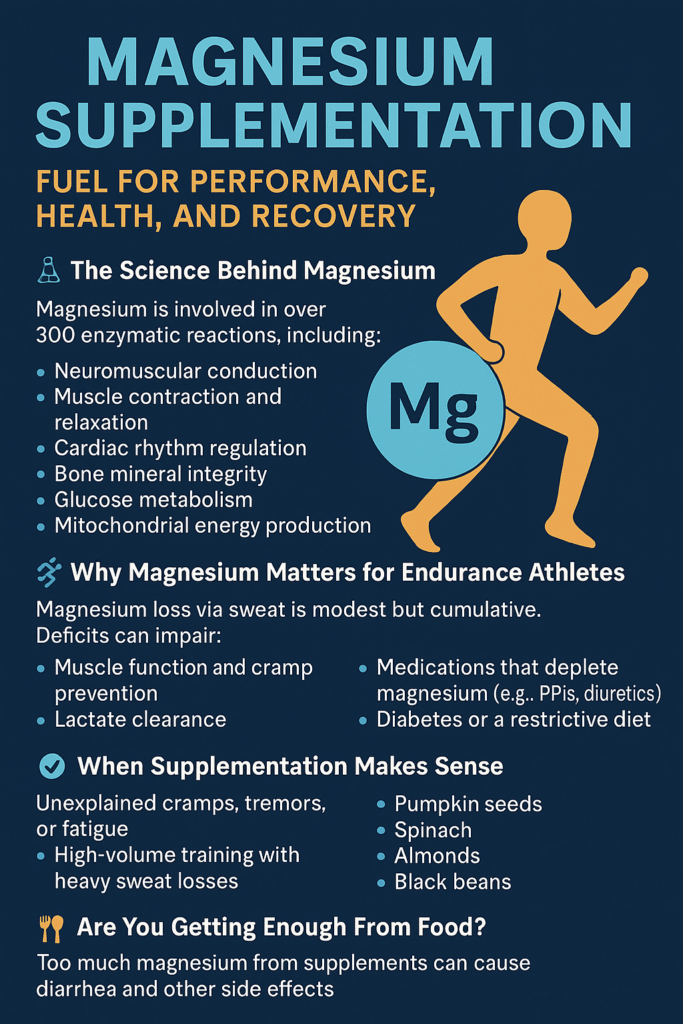Posts Tagged ‘Lifestyle Medicine’
Magnesium Supplementation: Fuel for Performance, Health, and Recovery
Magnesium Supplementation in Health and Performance
Section: Nutritional Optimization for Endurance and Functional Athletes
Subsection: Micronutrients — Magnesium
Overview
Magnesium is the second most abundant intracellular cation and plays a pivotal role in more than 300 enzymatic reactions. These include processes essential for:
Neuromuscular function
Skeletal and cardiac muscle contraction and relaxation
ATP synthesis in mitochondria
Bone mineralization and parathyroid hormone regulation
Glucose transport and insulin signaling
Regulation of systemic vascular tone and cardiac rhythm
Recommended Daily Intake (RDA)
Men (ages 19–70+): 400–420 mg/day
Women (ages 19–70+): 310–320 mg/day
Note: RDA reflects the intake needed to prevent deficiency, not to optimize performance or recovery.
Risk Factors for Suboptimal Magnesium Status
High sweat rate (endurance athletes, workers in heat)
Gastrointestinal disorders (Crohn’s, celiac, chronic diarrhea)
Chronic diuretic or proton pump inhibitor use
Diabetes mellitus (especially if uncontrolled)
Older age and low dietary variety
High alcohol intake
Inadequate intake due to dietary restrictions (e.g., vegan, low-calorie diets)
Clinical Signs of Potential Deficiency
Muscle cramps, tremors, or fasciculations
Fatigue, low-grade inflammation, or poor recovery
Sleep disturbances, including restless leg syndrome
Premature ventricular contractions (PVCs) or palpitations
Insulin resistance or elevated fasting glucose
Anxiety or mild neuromuscular irritability
Supplementation Guidelines
Indications for Trial Supplementation:
Confirmed low dietary intake
Belonging to high-risk groups (see above)
Unexplained fatigue or neuromuscular symptoms
Preferred Forms:
Magnesium glycinate (well tolerated, calming)
Magnesium citrate (well absorbed, mild laxative effect)
Avoid: Magnesium oxide (low bioavailability; often causes GI distress)
Dosing Strategy:
Start with 200–400 mg elemental magnesium/day
Administer with food to reduce GI side effects
Reassess symptoms and tolerance after 7–10 days
Dietary Sources
Food Source Magnesium (mg)
Pumpkin seeds (¼ c) ~190
Almonds (1 oz) ~80
Spinach (½ c cooked) ~75
Black beans (½ c) ~60
Dark chocolate (1 oz) ~65
Whole grain bread (2 slices) ~45
Precautions
Excessive supplementation may cause:
Diarrhea
Nausea
In high doses or in renal impairment: hypotension, bradycardia, cardiac arrest
Serum magnesium is a poor marker for total body stores. Consider clinical signs and dietary history first.
Clinical Note:
Endurance athletes, individuals with high-volume training, and those undergoing occupational thermal stress should be routinely screened for magnesium adequacy via diet recall and symptom assessment. Supplementation may improve recovery, neuromuscular performance, and cardiovascular stability in deficient or marginal populations.
Achilles Tendinopathy: The Endurance Athlete’s Slow-Burn Struggle
Achilles tendinopathy is a degenerative condition of the Achilles tendon, commonly affecting runners and triathletes. Unlike acute ruptures, tendinopathy involves a chronic failure of the tendon to heal—often triggered by repetitive overload without adequate recovery. It manifests with pain, stiffness, and impaired performance, especially during or after training. Increasing running training volume too quickly is…
Read MoreWhat is Lifestyle Medicine?
Let’s start by breaking down the two terms: lifestyle and medicine. Lifestyle is the way you live. It is, therefore, complex. The way we live is impacted by many things: family history, our environment, economics, personal beliefs and worldview, genetics, education, and who we socialize with, just to name a few. Medicine is the science…
Read MoreNutrition Lifestyle
A cornerstone of lifestyle medicine is nutrition.
Read MoreMuck’s Mucked up PR
Based on true stories…Muck stood in the transition area, shifting uncomfortably in his wetsuit, hugging him in places it had no business hugging. I think my wetsuit shrunk, he chuckled to himself.
Read MoreSystemic vs. Localized Inflammation: Understanding the Differences
Inflammation is a term used in common nomenclature but can have different meanings. Understanding systemic and localized inflammation is a good place to start. Inflammation is a natural defense mechanism the body uses to protect itself from harm, such as infections, physical injury, or chemical injury. It is a healing process. If it persists or…
Read More




